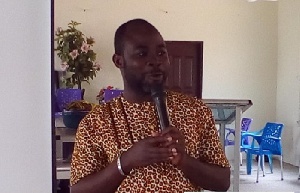The Adaklu Community Health Management Committee (CHMC) has been commended for contributing to effective healthcare delivery in the district.
CHMC is under the People for Health (P4H) programme being implemented by a consortium led by SEND Ghana.
Mr Charles Azagbah, Adaklu District Director of Health, commended the CHMCs for their sterling roles in reaching out to the residents in selected communities of the programme area.
He said the CHMCs was the mouthpiece for maternal and child health matters and nutrition.
Mr Azagbah was speaking at a sensitisation workshop for about 50 participants to strengthen their advocacy roles towards reducing inequities in the healthcare delivery system.
He said the Committees had helped to track under age-five mortalities and the number of children immunised in the project catchment area.
He urged the group to step up record-keeping measures to build sustainable data for the district.
P4H is aimed at ensuring improved access to quality health service delivery for citizens in 20 districts selected from five regions including Volta.
The project seeks to strengthen the organisational and institutional capacities of government and civil society organisations (CSOs) for mutual accountability in health, HIV, water and sanitation, and nutrition policy formulation and implementation.
It is a five-year project being implemented by a consortium of three organisations led by SEND-Ghana, a non-governmental organisation (NGO), with Penplusbytes and the Ghana News Agency as members, and sponsored by the United States Agency for International Development (USAID).
The target regions include Greater Accra, Eastern, Northern, Volta and Oti and spans 2016 to 2021.
Maternal and child health, Nutrition, family planning, malaria prevention, Water, Sanitation and Hygiene (WASH) are the health thematic areas being focused on in these communities of the region.
Mr Ebenezer Carboo-Hartog, Field Officer, SEND Ghana said the overall goal of the programme was to reduce discrimination in the healthcare delivery system and to identify community structures that would be harnessed at the local level, increase knowledge at the level and hold health workers to account.
He said the CHMCs were expected to draw practical action plans, build the capacity of community members and demand better services from health providers in line with its thematic areas.
He said the COVID-19 pandemic compelled the project to be extended to December 2021 instead of the March 2021 date for the termination of the programme.
Madam Antionnette Lanyo, Public Health Nurse at the Adaklu Health Directorate, said Maternal and Child health was crucial to attaining quality healthcare and praised the CHMCs for carrying key and timely messages to the community members.
She said couples must work consciously towards conception and never again left on the altar of accidental occurrence and urged them to be guided by factors under pre-conception period, ante-natal care, post-natal care including family planning measures.
Mr Promise Dogah, Nutrition Officer, said nutrition played a crucial role in the health of each individual but especially to women who planned conception, getting pregnant and delivery and post-delivery period for guaranteed health of mother and child.
He said a balanced diet should be all-encompassing fruits, vegetables, legumes, seeds, carbohydrates and proteins in the right proportion.
Madam Gloria Agyekum, Midwife in-charge of Tsrefe CHPS Compound, urged lactating women to abide by the breastfeeding modules to guarantee full nutrients needed for the child's growth and development.
She urged mothers to patronise health facilities for their circumcision needs and avoid quacks parading as experts.
She urged the public to demand licenses from such quacks before asking for services from them.
Five Communities from the Adaklu area including Wumenu, Torda, Waya, Kodzobi and Tsrefe are participating areas.
The USAID's P4H policy targets a reduction in inequities in the delivery of health services planning, monitoring and evaluation systems at the district and national levels.
Health News of Tuesday, 15 December 2020
Source: GNA

















